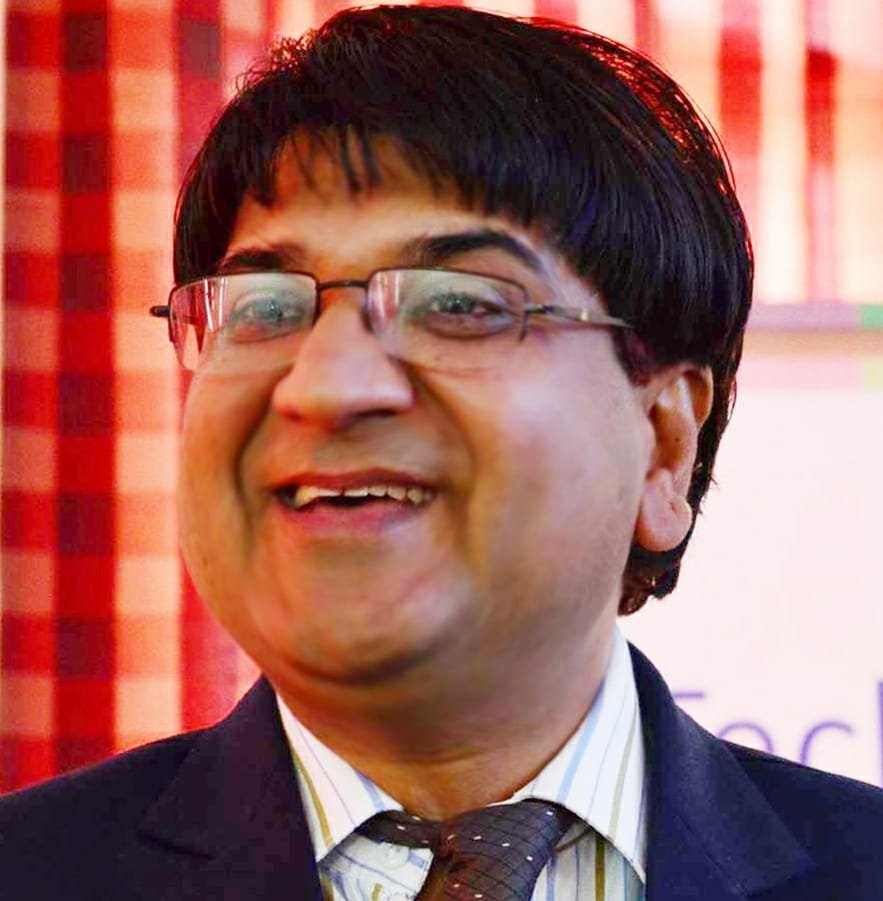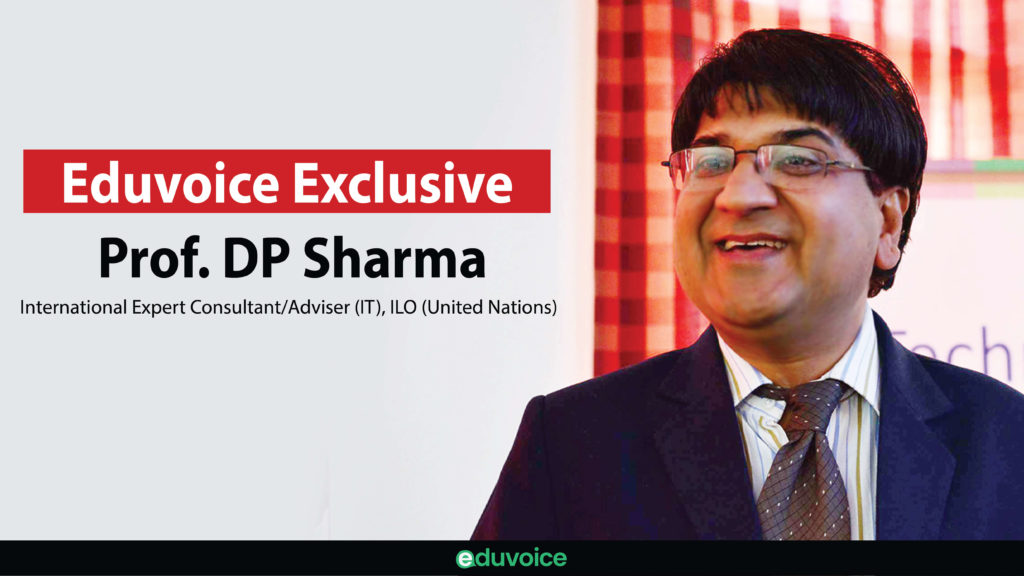Eduvoice exclusive interview

Dr. D.P. Sharma
Dr. Durga Prasad Sharma is an Indian IT professor, author, scientist, and orator. He is an enumerated legendary personality of Rajasthan who was invited by the Prime Minister of India Mr. Narendra Modi to support the nationwide campaign Swachh Bharat Mission as a Brand Ambassador (Youth & Education).
introduction
In the present scenario, the education system is going through many changes and paradigm shifts, posing many challenges to students and professors. Dr. D.P. Sharma is an Indian IT professor, author, scientist, and speaker. Dr. Sharma has been honored with several awards and accolades. He is a recipient of The Sardar Patel Life Time Achievement International Award (Sardar Ratna), one of India’s highest civilian awards given by the Sardar Patel Foundation.
Let us know from him about understanding and dealing with the challenges of the education world.

Sujata Mehta
In our education system, there is often a practice of rote learning and not necessarily practicing for the sake of learning. What do you think is the reason and what can be done to overcome it?

Dr. D.P. Sharma
The Indian education system is ancient but the education we have in our hands has become modern after independence in 1947. In my opinion, when a system completes its life of 10 years, it needs to be reviewed and revised. If it continues in its old ways; It can be ungovernable, unmanageable, and uncontrollable. Our educational systems also need end-to-end revision and remodelling.
COVID-19 has become a worldwide issue; however, it has given us all a huge opportunity to rethink, re-diagnose and re-analyze our existing systems and practices, be it educational design systems or delivery or teaching, or examination systems; Ultimately it needs a complete revision. I heard that PM Modi’s government has already taken this initiative to reform our educational systems in schools, colleges, and universities. Let’s wait for the results.
Let’s take an example EDX. About 10 years ago, I learned about the EDX program in the United States of America. This program has been designed in such a way that education will be made available at your doorstep.
It was a mix of technology and education. This program provided new hope with a new model of education with online delivery in an innovative way. This is the right time to think about change after Corona. Either we have to review, redesign and shift the traditional education delivery systems towards electronic platforms or replace them with emerging technology-enabled education delivery systems. So that education can be delivered to your doorstep on any device anytime, anywhere. In the current scenario, India’s internet-based systems are booming i.e. digitization of everything like the UPI system. Maybe after Corona, I think these changes together will play a vital role in setting up the emerging paradigm shift in India for the delivery of next-generation education.
Sujata Mehta: What could be the immediate solution to improve critical thinking in colleges and universities?
Dr. D. P. Sharma: Critical thinking is very important for communities of learners in schools, colleges, and universities. Let me take you through the history of India and its global glory. Our ancestors were researchers. I believe that the word ‘research’ has evolved from ‘rishi-karya’ and the word ‘scientist’ has evolved from the Indian ‘saint’. The internet is somehow becoming a hindrance to creative writing and creative thinking. In the future, creative writing systems will be developed with better intelligence and perhaps creativity.
Today we need to introduce a new system of evaluation of students’ knowledge, creativity, and critical thinking instead of examination and evaluation by data, information, and recall ability. Today, we neither use the old model of education nor the global modern model of education in our institutions.
These obsolete models are far from both localized and globalized. They need a hybrid version i.e. “glocalized model”, which has a judicious alignment with local, modern, and globalized progress. Today, in the field of education, there is a lack of adopting modernized education by mixing it with the preservation of our ancient educational heritage. In fact, these systems can easily be repurposed with smart optimization and contextualization to judiciously establish the next paradigm shift.
“We and our educational leaders, think, perceive and decide according to the two-dimensional or two perceptional mindsets and follow them with two different processes. One is academic politics and the second one is political academics.”
Furthermore, it is true that the traditional classroom culture cannot be completely set aside for the time being. Today, we can develop and assimilate emerging technology-enabled systems to deliver education at the doorstep of the learner through any device, anywhere, at any time. In these innovative education systems, students will be able to attend their classes on time or off time using both their convenience and affordability.
Educational perception and mindset are some of the most challenging issues in the Indian education system. Most of the government educational institutions are administered and managed by two-dimensional mindset i.e. academic politics and political academics. We can see them as research politicians or political researchers. Our professors, scientists, and educational administrators need to come out of these cyclones and focus on academics, research, and community services rather than political academics, research, and political services.
These technology-enabled and politics-free paradigms combined with the changed mindset of teachers and learners will be able to transform the entire educational system. In these change paradigms, we can involve professionals from various disciplines such as academia, research, industry, society, and spirituality.
SUBSCRIBE TO OUR NEWSLETTER
Get latest updates about our Exclusive Interviews, News, Articles on Higher Education Sector.

Sujata Mehta
It is often seen that the students coming out of colleges are not industry-ready, as they have to undergo some sort of training during their jobs and interviews. So how can that issue be resolved?

Dr. D.P. Sharma
This is a great comment on the educational model in our colleges and universities. Today, most courses in colleges and universities are designed without validation by non-business professionals, i.e., academic politicians in air-conditioned rooms. These courses usually lag far behind the latest investigative knowledge required in technology and business fields.
Another root cause of the mentioned problems begins with government agencies and their stakeholders whose mindset is political rather than professional. These bigchairs need to be dynamic to judiciously adopt the emerging changes but the reality is far behind. In developed countries, professional organizations are headed by purely professional experts who have the freedom to influence government decisions.
Our colleges and universities are becoming factories of degree certificates instead of professional knowledge. Today, the exponential growth of finishing schools and coaching centers which are mushrooming in the country are becoming suicidal factories of youth’s dreams. They are makeup packaging centers rather than knowledge and professional beauty centers.
Why don’t we allow the industry to be involved in the admission process of universities or colleges? I developed a four-pronged educational model for Indian educational institutions and industries. If we allow industries in the admission process, they can assess student’s knowledge, aptitude, and interest and accordingly, they can help in designing customized courses and content for the group of students. Also, they can sponsor, train and employ these students.

Sujata Mehta
Vedic literature holds immense importance in our culture. How do you think we can incorporate this into our education system?

Dr. D.P. Sharma
India’s post-independence educational leaders did little to develop, preserve, and judicious recognition of our ancient educational heritage and scientific contributions. Our ancient literature is a storehouse of scientific, spiritual, and multidimensional knowledge but we have failed to explore and reconstruct it.It is a universal truth that our Vedas are not only full of scientific, spiritual, and philosophical knowledge but are the source of scientific truth. These are oceans of knowledge and such books have never been written and seen before in the world. Our forefathers Rishis were originally known as spiritual leaders, but in reality, they were true scientists. I believe that our forefathers (sages) were known as “sants” and then the words “saint” and “scientists” were coined. When the people of Europe and America were nomads, our forefathers, rishis and sages, discovered the knowledge of astronomy, mathematics, medicine, physics, and chemistry.
If you think a little deeper, you might find that the architectural design of the “computer” is borrowed from Vedic Mathematics (Ekadhiken Purvena). That’s why it is very important to believe that Vedas are very important texts, but we did not try to find the knowledge written in these texts.
Today, when scientists develop small things, they run for patents, but our ancestors had a lot of scientific contributions, but we lag behind in taking credit, patents, and citations.
Through conspiratorial methods, it was planted in our minds that Sanskrit is the language of the backward. This is the language of people who do not believe in science and technology. Their culture is like Orthodox. Nowadays researchers have proved that Sanskrit is the most morphologically rich language for systems like artificial intelligence and robotics which is well understood by computer and IT professors and scientists. These inferiority complexes were so ingrained in our minds that we ourselves considered civilization as the civilization of bygone people.
This plight of ours has happened because of our 800 years long oppression, suppression, and depression. Today we have to come out of this, otherwise, our civilization will not only be challenged by intruders but our civilization will be destroyed. Out of a total of 49 civilizations of the world, our Sanatan civilization is the only one which survived even after thousands of years of invasions. If we don’t wake up now, our contributions and glory to the world will be forgotten.
People who have a scientific temper, people who have wealth, and depth of social and spiritual knowledge, have to come closer. They have to sit together so that forgetting all religious differences we can walk on the path of “Dharma”. Today only India and Indians can re-establish the principle of Natural Justice in the world with peace, prosperity, and universal brotherhood, which means –
Natural Justice = Duty+Responsibility+Privilege

Sujata Mehta
Sujata Mehta: Guru-shishya Parampara has been a part of our culture and society. However, in current times our teachers are not receiving respect and stature. So, how can we as a society should work on that?

Dr. D.P. Sharma
Well, let me once again go back to the values of India’s ancient and cultural heritage. Today we want teachers to come to our doorstep to teach, however, Lord Rama was one of the greatest dynasties and his father King Dasaratha could have called Guru Vishvamitra to his palace to teach Rama, but he did not.
We have great examples like our former Presidents, Sir Sarvepalli Radhakrishnan, and Dr. APJ Abdul Kalam, who are highly respected teachers, and gurus in our society because of their backgrounds and contribution to research and education.
The question arises what do we have to do for the restoration of moral values and Guru Shishya Parampara? We need to set goals and examples with a high level of academic achievements, sacrifices, and standards to inspire people and understand the values of teachers and professors.
People all over the world who did not have this kind of culture are adopting our culture. People who were born and brought up with different values and cultures, but have discarded them and followed our teachings and values. But we are forgetting our values and cultures. So teachers/gurus have to re-establish that respect.
Otherwise, if the pillars of Guru Shishya Parampara fall in India, it will be a great challenge for the entire generation and will be irreversible. Also, teachers and professors should focus on their roles, responsibilities, standards, and ethics instead of privileges and rights. It is observed that; Some of them become political slaves either for positional advantage or for other benefits.
To understand this whole scenario, who should be an educationist?
Here we are not referring to any particular community, otherwise, another round of political debate will start on this. But in ancient times a particular community responsible for education initiation had high-quality attributes, high-quality morality, high-quality sacrifice, and high-quality determination.
Most of them were true teachers, Brahmarishis, and known for extreme sacrifice and morality
But today, they have lost everything. If we need to go back, the educationist fraternity needs to review their attributions, weak points, and vulnerabilities, and stand up with the new educational model of ancient and modern convergences.

Sujata Mehta
According to you, what changes will come in the education industry post-COVID-19?

Dr. D.P. Sharma
Post Covid-19 paradigm shift is already visible and we and our systems are slowly shifting towards technology like Webinars, Web Conferencing, Tele-Minar, Web-Examination, Web-Presence, and Web- Class, etc.
The post-Covid education culture, work, governance, management and meeting culture, etc. will change dramatically. We need to bring people closer to technology.
You know; To reduce traffic, pollution, and transportation costs; We need to shift towards the emerging green paradigm of e-culture.
There are concepts of technological determinism, sociological determinism, political determinism, and more. Today society has changed technology to a great extent, but now technology is changing society. Initially, your grandfather might not want to own a mobile, but once he gets used to the mobile phone, he becomes a tech-savvy citizen or netizen.
Therefore, there should not be an end-to-end change, but a sensible change. We need to design and adopt an alternative education system to face the post covid life and survive with comfort and glory.






